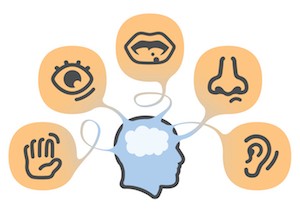 Have you ever thought “Goodness me, I can’t remember what I watched on television last night? My short-term memory is shot!”? In my memory clinic, so many tell me how worried they are because they forgot to pick up milk at the supermarket or can’t remember which day they went to the doctor. The good news is that these aren’t short-term memory problems at all! Here’s why!
Have you ever thought “Goodness me, I can’t remember what I watched on television last night? My short-term memory is shot!”? In my memory clinic, so many tell me how worried they are because they forgot to pick up milk at the supermarket or can’t remember which day they went to the doctor. The good news is that these aren’t short-term memory problems at all! Here’s why!
Your short-term memory is very short indeed. It lasts only a few seconds, thirty seconds at most and consists of what is in your mind right at the moment. Research tells us that short-term memory serves us well. In my own research into memory as we age, people in the 50-70 year group often achieved better short-term memory results than younger adults. Maturity has advantages!
 The job of your short-term memory is to gather all the information from your senses. Every moment your senses are bombarded with images you see, sounds, ‘things’ you feel through touch, smells and tastes, as well as all the emotional reactions evoked by these. Most of the sensations you experience vanish as quickly as they come, unless some of them are so important to you that you focus on them and they move into your awareness – your short-term memory. To recall them accurately later, though, you need to really pay attention and interact with the information in some way so that it is locked away into your long-term memory for later recall. The whole business takes about seven seconds. Short-term memory is the gate-keeper to your memory – if you remembered everything you saw, heard, tasted, touched, or smelt, your memory system would be overwhelmed and unable to function properly. It is the job of your short-term memory to filter out unimportant information.
The job of your short-term memory is to gather all the information from your senses. Every moment your senses are bombarded with images you see, sounds, ‘things’ you feel through touch, smells and tastes, as well as all the emotional reactions evoked by these. Most of the sensations you experience vanish as quickly as they come, unless some of them are so important to you that you focus on them and they move into your awareness – your short-term memory. To recall them accurately later, though, you need to really pay attention and interact with the information in some way so that it is locked away into your long-term memory for later recall. The whole business takes about seven seconds. Short-term memory is the gate-keeper to your memory – if you remembered everything you saw, heard, tasted, touched, or smelt, your memory system would be overwhelmed and unable to function properly. It is the job of your short-term memory to filter out unimportant information.
Left to its own devices, your memory doesn’t always retain exactly what you will want to recall later. Have you had the experience of hearing the name of a product or website address on the radio? You are sure you have it, but by the time you have found a pen and paper it has vanished into thin air. It is most frustrating, and a prime example of a short-term memory failure. So how can it be improved?
 The most important technique is to pay attention and focus on the information you want to remember. No multi-tasking, please! It’s a bit like shining a spotlight on important information and rehearsing it before it vanishes. We often do this with telephone numbers – looking up a number and repeating it until we can either dial it or write it down. That’s exactly what we need to do with other information, too. Focus carefully on information that is important to you and your clever short-term memory will ‘dump’ the rest.
The most important technique is to pay attention and focus on the information you want to remember. No multi-tasking, please! It’s a bit like shining a spotlight on important information and rehearsing it before it vanishes. We often do this with telephone numbers – looking up a number and repeating it until we can either dial it or write it down. That’s exactly what we need to do with other information, too. Focus carefully on information that is important to you and your clever short-term memory will ‘dump’ the rest.
Try these exercises to practice your short-term memory skills.
(a) Look carefully at these numbers and repeat them to yourself a few times. Then turn away from the computer. Can you recite the numbers? Can you recite them backward? You can practice this with number plates, telephone numbers on billboards and so on.
So, focus carefully on these: 7 4 2 8 9 5 1
(b) Take a few moments to memorise the following words. Again, turn away from the screen and see if you can remember them all. Recall the words again during the day and before going to bed tonight.
bear trouble nest train garden biscuit camera letter
This is something you can practice yourself with any words; another exercise is to look at a picture, turn away and recall as much detail as you can.
Practicing your short-term memory skills will soon have you remember much more of what you see, hear, touch, smell, and taste.
By Dr. Allison Lamont.









Join the Discussion
Type out your comment here:
You must be logged in to post a comment.